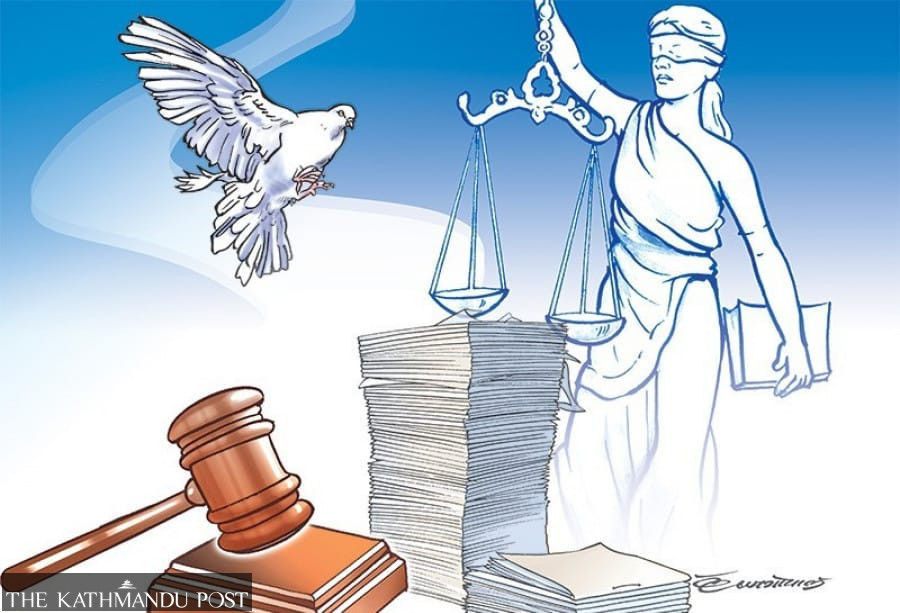National
Conflict victims and rights activists are sceptical about government’s intentions
Stakeholders stage sit-in as parliamentary panel works to finalise a disputed bill on transitional justice.
Binod Ghimire
As a parliamentary panel prepares to finalise a bill to amend the Enforced Disappearances Enquiry, Truth and Reconciliation Commission Act, the insurgency victims, human rights activists and civil society members staged a sit-in in the Capital on Friday to pressure the committee to correct flawed provisions in the bill.
Carrying placards with various slogans, they demanded the sub-committee of the Law and Justice Committee of the House of Representatives make revisions to the bill to ensure a trustworthy and transparent process to give justice to the victim community. “We have gathered to warn our lawmakers to correct every provision that serves perpetrators,” Kalyan Budhathoki, acting chair of the Conflict Victims Common Platform, told the Post. “Several provisions in the bill are aimed at shielding the perpetrators.”
The victims and the rights defenders say, based on past experience, they have doubts that the bill gets revised to make the transitional justice process victim-centric. Despite making commitments during various consultations to address the victims’ concerns, the government in March registered the amendment bill in Parliament by retaining the several “problematic” provisions of the previous bill, which couldn’t get through the federal parliament.
Along with the victims and human rights defenders, both domestic and international human rights organisations have pointed out several flaws in the bill that contradict international standards on human rights. Though Nepal at different international forums has committed to prosecute those involved in serious violation of human rights, the current bill gives room for amnesty even in heinous crimes.
The stakeholders are particularly sceptical about the government’s intentions since the bill has not listed murder as a serious violation of human rights. In their joint statement, different international human rights organisations including the Human Rights Watch and Amnesty International in March had said, "it would be difficult or impossible to prosecute those responsible for serious violations of international law including war crimes and crimes against humanity (if the bill wasn't amended before it gets endorsed)."
Lawmakers from various parties have registered 27 different amendments to the bill to address the concerns of the stakeholders.
Along with listing murder as a serious violation of human rights, setting up special investigation units in the transitional justice commissions or the prosecutor’s office tasked with evidence collection, addressing the issues of child combatants and allowing the Judicial Council to nominate judges for the new ‘special court’ to be set up to hear conflict-era cases are some of the amendments proposed by the lawmakers. Similarly, they also have proposed a revision of the law to ensure that the office bearers in both the transitional justice commissions are appointed after proper consultation with stakeholders, and the victims, especially those who faced sexual violence, are provided protection.
“It is established that the minors like me were used as combatants by the then CPN-Maoist. The bill doesn’t have any provision to address our issues. Nobody will own up to the transitional justice process that ignores us,” Lenin Bista, the founding chair of the Discharged People's Liberation Army who also was present in the protest, told the Post.
Neither the existing Act nor the bill that is under consideration in the House committee mentions anything about the minors. During the verification process for army integration conducted by UNMIN in 2007, thousands of Maoist fighters, including Bista, had been disqualified for being minors.
Among the 4,008 combatants who did not qualify for integration, 2,973 were verified as minors. Bista along with his eight colleagues have even filed a case at the Supreme Court demanding legal action against Maoist chair Pushpa Kamal Dahal and Baburam Bhattarai, then chief of the people’s government.
“We are closely watching the parliamentary process. We won’t accept any attempts at retaining the provisions that protect the perpetrators,” said Gopal Shah, chairperson of the Conflict Victims’ National Network.
The sub-panel under the human rights committee has a week to prepare its final report and present it to the committee. The bill will be presented in the lower house after it is endorsed by the committee.




 10.12°C Kathmandu
10.12°C Kathmandu















